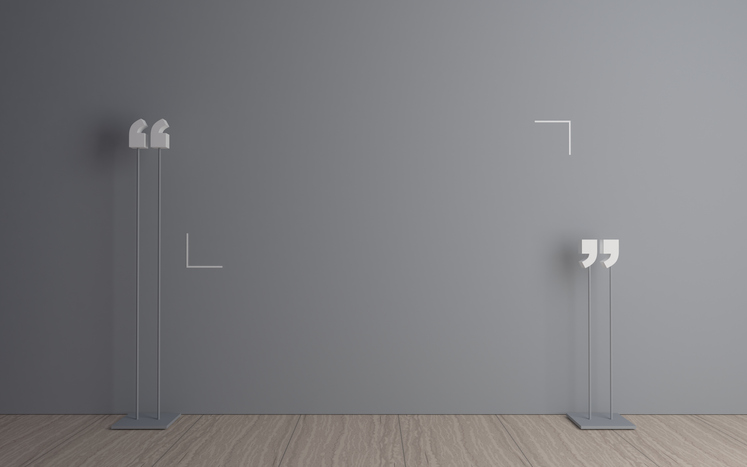Words matter in times of global upheaval

Following Hamas’s terror attack on Israel on 7 October and Israel’s declaration of war in Gaza, events in the Middle East have dominated world headlines and threatened social cohesion, including in Australia. To avoid a noxious spillover of violence and vitriol, Australians have a duty to avoid the sort of rhetoric that harms national unity.
On 12 October, the head of the Australian Security Intelligence Organisation, Mike Burgess, spoke on the recent events in the Middle East and their ramifications for security in Australia. He cautioned: ‘[I]t is important that all parties consider the implications for social cohesion when making public statements … [W]ords matter. ASIO has seen direct connections between inflamed language and inflamed community tensions.’
While the responsibility to safeguard social cohesion lies with every Australian, the media plays an especially important role. And in an age of near-universal social media use, this includes non-traditional media influencers and other public figures who boast large online followings. The temptation to attract views, likes and engagement through provocation must not trump the responsibility to conduct a thoughtful and measured response to injustices, recent or historical.
This is perhaps wishful thinking. Social media isn’t known for its nuance and dedication to the careful participation in discourse that such matters demand. Instead, it is liable too often to decay into a cacophony of simplistic and corrosive exchanges. Yet, as Burgess said, it is incumbent on each participant in this discourse to consider the power of their words on individual and collective wellbeing, including the potential for such expressions to vilify and exclude entire groups.
For nearly three decades, Middle Eastern and Arab men and boys have been portrayed by sections of the media and the entertainment industry as a menacing threat, both to individuals and national security, if not to Western civilisation itself. In the wake of Hamas’s vicious attacks on Israeli civilians, the re-emergence of this typecasting threatens social cohesion across the world and perpetuates false narratives that distract a war-weary humanity from the ultimate peace process that must prevail if this and other conflicts are to cease.
Social media carries the potential to supercharge these stereotypes and entrench social division through a self-propelling cycle of vitriol and rhetoric. More anger and hate will do nothing for those who, as we watch these horrors unfold again, are once more burying their dead and suffering irreparable loss.
The wave of grief from the outbreak of violence on 7 October took only hours to reach Australian shores, where it just as quickly began to tear at the fabric of our multicultural, multifaith and multiethnic society. Our open democracy allows each of us to express our views freely, but if such opportunities are squandered by deploying hateful, anti-Semitic, Islamophobic or racist messages, we are all poorer for it. If we are to maintain the precious gift our freedoms afford us, we must likewise shun the all-too-easy insults and stereotypes that have divided us before.
In the aftermath of the 9/11 terrorist attacks, and with Australia, the US and others engaged in conflicts across the Middle East and North Africa, the brush of rhetoric tarred a whole community. Simplistic narratives of the Middle East’s history and society—exemplified by the belief that the coalition invasion of Iraq would usher in an era of prosperity and liberalisation with the grateful cooperation of a unified Iraqi nation—combined with racist and Islamophobic tropes to create distrust and resentment.
Sections of the media were either unable or unwilling to quell this toxicity, and some fuelled the flames of discord. Added to this was a dearth of representation in much of the popular media, providing the public with a limited range of narratives about people of Middle Eastern extraction. This in turn created a narrow conception of what people from that region valued.
The post-9/11 media environment heaped millions of ordinary people in with the perpetrators of those and other terrorist attacks, crimes or delinquency, giving rise to events like the 2005 Cronulla riots and countless reported and unreported instances of racial abuse.
While some of these narratives have cooled in intensity, the Israel–Hamas war threatens to usher in a new episode in media portrayals of Arabs, Iranians and others as dangerous and violent people intent on ‘destroying the West’.
Of course, prejudicial depictions in news and entertainment media aren’t reserved exclusively for those from the Middle East. Over the past half century, the baton has been routinely passed between Africans, Eastern Europeans, Arabs and Iranians in the relay for ‘Hollywood villain from a foreign land’. Anti-Semitism, a mainstay of propagandists for millennia, is also growing across the globe and the Israel-Hamas conflict threatens to exacerbate this most heinous brand of discrimination. Anti-Chinese sentiment, after the emergence of Covid-19 and with growing US–China tensions, has likewise been amplified.
But the renewed focus on the Middle East’s conflicts, the outrage at Hamas’s attacks and concerns about Israel’s response and Gaza’s desperate humanitarian situation once again threaten to draw the public into simplistic and cynical analyses of the region and its people, driving exclusion, extremism and social tension here.
Social cohesion demands that each individual is held to account for their actions and judged by the content of their character, not for their ethnicity or faith.
To protect Australia’s social fabric, public figures, media organisations, think tanks and every Australian should heed the words of Mike Burgess. In a world suffering the pangs of ethnic and religious conflict in so many places, Australia offers a model, albeit with room for improvement, of a community capable of security, cohesion and prosperity. Ambitious as it is, we must aim to export these ideals of plurality and harmony, not import the divisions that have left so many corners of the globe bloodstained and divided.